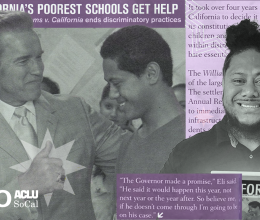
LOS ANGELES - The American Civil Liberties Union and the State of California today announced they had reached a settlement agreement in the class action education lawsuit Williams v. California. The suit was filed by the ACLU, the law firm of Morrison & Foerster, the Mexican American Legal Defense and Education Fund (MALDEF), Public Advocates, Inc. and other groups on behalf of California students who attended substandard schools in California.
"This is a watershed moment for public education in California," said Mark Rosenbaum, legal director of the ACLU of Southern California. "With this settlement, Governor Schwarzenegger has held California accountable for assuring equal educational opportunity for all of its children, ending decades of neglect and indifference. Equally important, it sets standards for access to books, teachers and clean and safe facilities and holds districts accountable for meeting those standards in our lowest performing schools."
"Fifty years after Brown, the dream will no longer be deferred," he continued.
The Williams lawsuit, originally filed in May of 2000, charged the state with reneging on its constitutional obligation to provide students with the bare essentials necessary for education: sufficient instructional materials, adequate learning facilities, qualified teachers, etc. Then-governor Gray Davis decided to fight the suit and retained a private law firm to litigate the case, costing tax-payers at least $18 million.
The settlement requires that all students have books and that their schools be clean and safe. It takes steps toward assuring they have qualified teachers and it holds schools accountable for delivering these fundamental elements to students. It provides nearly $1 billion to accomplish these goals: $800 million over four years to make emergency repairs in the lowest performing schools (those ranked in the bottom 3 deciles under the statewide Academic Performance Index [API]); nearly $139 million for new instructional materials for students attending schools in the bottom two API deciles; $20 million to inventory facilities needs in the lowest performing schools and $30 million to build County Superintendents' capacity to oversee low performing schools and fund emergency repairs in those schools next year.
The settlement requires legislation to:
' Provide financial assistance to repair low performing schools through a new $800 million School Facilities Emergency Repairs Account;
' Create new standards for instructional materials and facilities, and require the Concept 6 (shortened school year) calendar to be eliminated by 2012.
' Post instructional materials and facilities standards in all classrooms;
' Collect data on compliance with these standards, and teacher requirements;
' Verify this data;
' Intervene in decile 1-3 schools if the instructional materials and facilities standards are no met, and in any district having difficulty attracting, retaining or properly assigning teachers;
' Improve the teacher supply by streamlining requirements for out-of-state credentialed teachers to earn California credentials;
' Create a School Facilities Needs Assessment program;
' Require each district to implement a facilities inspection system; and
' Include new schools in the High Priority Schools Grant Program when current schools are phased out.
"We became involved in this case because conditions at my son Eli's school were dismal and unacceptable," said Sweetie Williams, father of Eli Williams, the lead plaintiff in the lawsuit. "When I saw the education my son was receiving I became very concerned about my son's future and wanted to do something. Being part of this case has shown me that it only takes one person to stand up when there are good people standing behind you."
"I couldn't be happier about this settlement," he continued.
"I have been privileged to represent in this case some of the strongest champions of social justice I will ever meet: students who know they and their siblings and peers deserve better and who were willing to stand up for themselves and for others."
"This historic agreement would not have been possible without the Governor's commitment and leadership on this issue," said Ramona Ripston, executive director of the ACLU of Southern California. "This settlement will bring real results to the millions of school children in California who are not being given a fair shot at a decent education."







